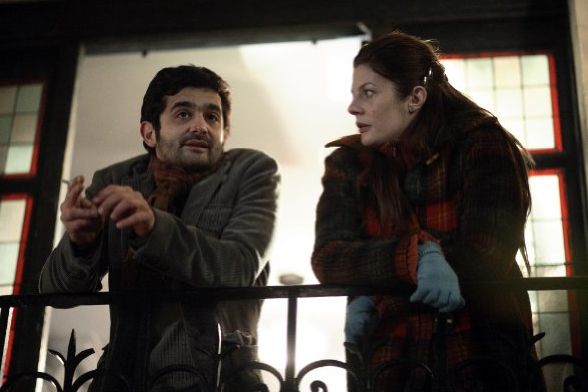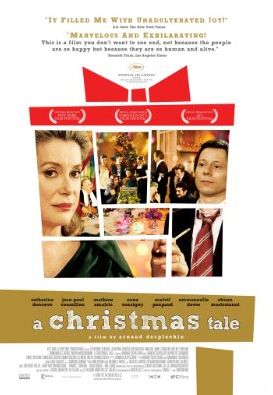Criterion and IFC have formed a partnership which has offered Criterion access to their catalog, which means over the next couple we're going to see more modern films from the company than ever before. This is surely a boom for both companies, and for those loyal to the Criterion label, it may foist more modern (and modern classics) upon them. The signature of CC still carries weight with any real cineaste. But more than that, foreign cinema has been taking it in the shorts due to the recession. Granted, the peak for foreign cinema was the post-war boom of the late 50's and 60's, but things are much more dire currently, and it's hard for average theater goers to get their hands on foreign and indie cinema without a dedicated theater, and even then it can get hard. My review of A Christmas Tale after the jump.
And so for many - even informed - filmgoers, Criterion's A Christmas Tale is going to be their first experience of Arnaud Desplechin's cinema. Here the writer-director follows a family as their mother Junon (Catherine Denevue) is taking ill with cancer. Consulting with her four children, she checks to see if she can get a transplant, which has a very small chance of healing her. There is one daughter in Elizabeth (Anne Consigny), and three brothers. Elizabeth helped her brother Henri (Mathew Amalric) out of debt at one point in his life, but in doing so asked that he be banished from her life. Then there's Ivan (Melvil Poupaud) and Paul (Emile Berling), who have connective tissue with Sylvia (Chiara Mastroianni) who loves one and married the other. The whole family gets together and spouses and girlfriends show up, including Henri's lady-friend Faunia (Emmanuelle Devos) as Henri announces that he has a matching type for their mother.
The domestic trouble of a family reunited is the main drama here, but the greatest pleasure I got was watching the film as it settles on letting the performers interact. If this is a film that one admires more than loves, it may be because Desplechin is such a cineaste that he never allows himself to exploit the cancer, which is the mechanism that creates the narrative. The film offers something of a resolution, but it mostly enjoys having the characters cross paths and getting their tempers and emotions to flare without presenting everything in a labored, structured way. Desplechin never engages in histrionics, and there's often a sense of French detachment to much of it, though there is at least one good right jab delivered.
The great thing about the film is that it gives its performers such room to breathe, and it's fun to watch performers like Amalric, Devos, Mastroianni and Consigny bounce off each other. These are some of France's best actors, and they are infinitely watchable. And there is a lot going on, I got the most pleasure out of how the film traffics in a very frank sexuality, and there's often a great sexual undercurrent to many of the scenes. There's also the presence of the great Denevue. She's always a pleasure to see on screen, and age has treated her kindly. But, as I said, this is also the sort of film that may be easier to respect than love. Films don't have to add up to anything, but the film seems very modest in its goals, and so much is achieved in the smallest of gestures. This is about a family, and what's fascinating is that Desplechin's film-lover background pops up every once in a while, so you can see a strange homage to something, but then it flickers away. For many this may be like spending time with their family at the holidays, and that is part of the film captures perfectly, the harmony and idiosyncrasies of a group of people who both could not be closer or more further apart.
The Criterion Blu-ray presents the film in widescreen (2.35:1) and in 5.1 DTS-HD. The picture and sound quality is excellent for sure. The main supplement is the documentary L'aimee (66 min.), which Desplechin made about his family selling the house he grew up in. Much like the film it's a mellow look at their home and life, and features some great music cues. Complimenting that is the featurette "Arnaud Tale" (36 min.) which features English language interviews with Desplechin, Amalric, and Denevue. The three have worked together before and seem familiar with their working habits. The set is rounded out by the American and international trailers for the film.



